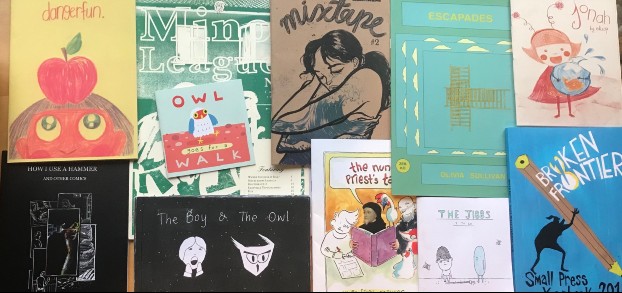
Way back in 2014 I wrote a guide for small press comics creators on how to increase their chances of getting a review and how to build up a profile for their comics practice. It’s far and away the most read thing I have ever written for Broken Frontier and still brings in considerable traffic. But the scene (and the world) has changed since 2014 and I’ve felt for some time that it was overdue for updating and expanding. It’s all the more important given the current situation for self-publishers and how restricted they are in being able to sell directly to their audience. Online reviews have taken on an added significance as a means of generating sales this year.
So here’s an updated 2020 version of ‘How *Do* I Get Coverage for My Self-Published Comic? – Thoughts on How to Secure that All-Important First Review and Increasing Your Audience Afterwards…’. I hope this is of some use to our wider community in a year when we all need to be supporting each other and elevating up-and-coming voices more than we ever have before. Some of it will be familiar from the original version while some of it will be new. But for those starting out on their self-publishing journey there should be a few pearls of wisdom to take on board here.
Getting that all-important first review for your self-published comic can seem like a daunting task. The ever burgeoning pool of new small press talent currently out there producing exciting work – and taking the initiative to publish it in physical form themselves – is a wonderful thing to behold. It’s a harsh reality, though, that the growth of self-published comics output in the UK far exceeds the number of outlets available to cover it. And right now securing a review is more important than it has ever been in publicising your work.
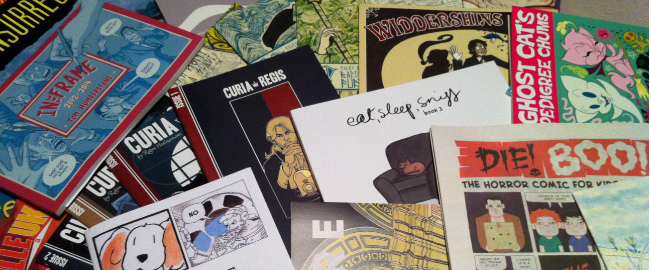
So what can you do to maximise the possibility of your comic/zine/book getting some article inches? I’m not going to pretend that the points below are the ultimate self-help manual to answering that question and my thoughts on this will inevitably have a Broken Frontier spin on them. What I can bring to the table though, as the Editor-in-Chief of a site that has specialised in self-published comics coverage for a decade, is the perspective of one of those very people whose time and attention you will be looking to win. Hopefully this will give you some thoughts to mull over about the “dos and the don’ts” when planning your review strategy, and how to then build on any coverage you do get…
This is pitched very much at the grassroots, D.I.Y. culture section of the British scene – those creating work with print runs that may not even reach three figures. In that regard a number of the following thoughts may seem blindingly self-evident to many readers. But in all my travels and discussions – both online and out there in that big, real, physical world – I am constantly surprised by how up-and-coming creators fail to grasp the potential of even the most obvious opportunities to market themselves and their work. As ever, if just one reader gets an extra review out of this it will be worth the effort!
Have an online presence before you ask for reviews
There are two things you should have in place before approaching reviewers. One is desirable while the second is essential. Firstly, some form of online showcase for your work that can be linked to, be it a full-fledged website, a blog, or whatever. An online presence with examples of your comics allows reviewers to send traffic your way and offers our readers a more immersive appreciation of your work. Check out the sites of small pressers Olivia Sullivan, Peony Gent and Aleesha Nandhra for excellent examples of creators who know how to showcase their art online.
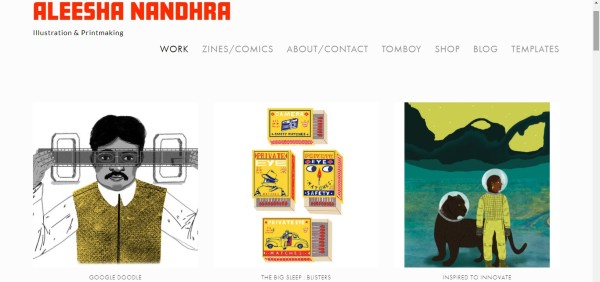
Secondly, and crucially, if you are serious about wanting review sites to cover your work then an online store is a must. A review is a three-way relationship. The reviewer has a responsibility not just to give a fair and balanced evaluation of your work for your benefit but also to provide a service to their audience. If we cannot direct our readers to a link allowing them to purchase a copy of the comic in question then the entire exercise becomes pointless. A good review is worthless if nobody can actually buy the work in question. The existence of an online store is one of the first things I will look for when considering review submissions.
Simply providing an e-mail address as a way in which potential purchasers can get in touch to buy a copy is also unlikely to get you any extra sales. A good review may get you impulse sales through the convenience of minimal clickability. There’s little chance of anyone going through the hassle of e-mailing you and sorting out payment in a more cumbersome way.
Target your reviewer if possible
Most comics sites have a general submissions e-mail address. But if the site also has an obvious designated specialist in small press/self-published/minicomics and their contact details are listed (as we do with ‘Small Pressganged’ at Broken Frontier!) then target them personally. Not the site’s generic e-mail. Not the site’s Twitter account. Not the site’s Facebook page. It’s very easy for your book to get lost in the glut of general review requests. Focusing on the specific designated staff member with an obvious and stated interest in that area is more likely to pay dividends. When approaching them appeal to their interests. Explain why you think your comic would be a good fit for their time based on both their coverage to date and similar books they may have reviewed.
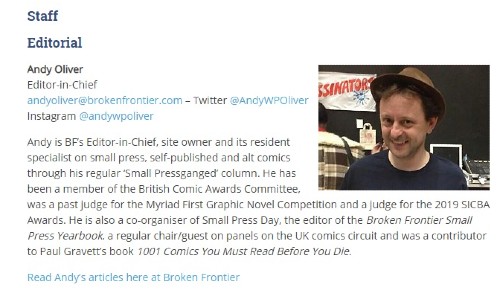
It’s worth underlining again that review requests (from our perspective anyway) should always be sent to the site e-mail address. Requests sent via DM on social media get lost in the daily build-up. There are nine different Broken Frontier-related social media accounts and we can’t always keep track of DMs across them all. This is why we have a specific reviews e-mail on the Contact Us page on the site. E-mailing is the most professional way to approach a site.
How to pitch that e-mail request
So to sum up. This is what we always suggest when e-mailing Broken Frontier for small press coverage.
(i) A couple of short sentences about the comic’s style, themes, subject matter and why it may be of interest to the reviewer given previous coverage.
(ii) A couple of sample pages.
(iii) A link to your site/store.
Don’t put your work down when e-mailing (no “You probably won’t think this is good enough to review…”-style opening statements). Be succinct because review sites get a lot of requests and make sure to include a couple of pages within the e-mail so the reviewer has an immediate visual reference. And finally add that site/store link so we know our audience can buy your work easily online.
Always offer a choice of physical or digital copy for review if possible
In the first instance this is a basic courtesy. Some reviewers may prefer to read a physical copy. It’s important to remember that the person you are approaching is not reviewing comics online as their primary source of income. The actual likelihood is they are doing it for free for the love of the medium. They may prefer not to spend their spare time reading from a screen as well.
But there’s a far more important reason as to why a physical copy is more likely to get you that review. I am going to let you into a little secret here. There is a guilt factor attached to a physical comic that a PDF will never have. PDFs can get overlooked. They can get lost in the daily influx of an e-mail inbox or saved in the wrong place on a laptop. Hard copies are less likely to be forgotten. Reviewers will always feel more obligated to cover a physical copy that has been sent to them because it represents money, time and effort.
If you are sending a digital copy make sure to get the balance between quality and file size right. We really don’t have the time to download GB-sized review copies…
Play to the strengths of your chosen format
If part of the reading experience of your comic is a tactile one, or its physicality adds extra layers to the narrative, then you are short-changing yourself by sending a digital copy to a reviewer. They will not be able to assess that aspect of the book as effectively and you will lose commentary on an important selling point of your comic.
Review request etiquette
Don’t ask for a review of out of print material unless it is available online. Again this comes down to that aforementioned three-way relationship. A reviewer is wasting their audience’s time giving commentary on a book that is no longer available. If the work is still accessible online then it’s another matter entirely. But don’t expect reviews for work that cannot be obtained by a site’s readership. And, yes, this does happen surprisingly frequently from people more interested in feedback than sales.
And please don’t ever ask a reviewer for a review, secure their agreement, and then send them a link to your online store and expect them to buy their review copy. A strange but true experience I have certainly had on more than one occasion…
Different sites will have different priorities when it comes to small press comics
This is the point in the previous edition of this article that I started speaking about small press super-hero comics and how hard a sell they are to reviewers. I want to think a little more broadly here though this time and talk about the different priorities that sites that review self-published comics may have.
So… small press super-heroes? Yes that’s going to be an uphill battle at Broken Frontier if you’re hoping for a review. It’s not impossible and I have occasionally covered them but when I have it’s been because the creators involved have approached them as vehicles for their own storytelling. Not as auditions for writing Superman. But the same is probably true for a number of other genre comics-inspired material including your zombie comics, your ninja comics, your cyborg comics and your zombie-ninja-cyborg comics.
So, again this comes down to targeting sites that are a good fit for your work. At BF I will be looking for more alternative self-published work that experiments with the form and does interesting things with the language of comics. That will be my priority over narrative/more traditional approaches to the medium. Other sites may well have very different interests. Look around, work out who is most likely to be receptive to the kind of comics you’re producing and prioritise those venues.
Make sure there are pages of your comic available online
This is one of the most frustrating things I deal with when it comes to self-published work. Sometimes a reviewer may turn to a pile of physical copies for a quick review that is needed to be run immediately. With no time to approach creators and wait for images to run with it we’ll check your websites/stores for pages. Creators who have the foresight to include them will get the reviews. Those who have no internal pages available online won’t.
Even generally, though, this is a must if you have any hope at all of generating sales online. This is a visual medium so make sure your audience can see your work and realise for themselves just how amazing it is! Full pages also give a clear indication to the storytelling strengths of your work. Arty, sideways clips of your comic as a physical object possibly have a certain aesthetic appeal but they’re also of limited use to reviewers. Do put up full pages so readers can see your sequential storytelling skills. Single panels may look pretty in isolation but again they say little about your skills as a sequential storyteller.


Shots of pages from Danny Noble’s story in the Broken Frontier Small Press Yearbook 2016. The example on the left is of no use to reviewers. The example on the right is!
Not getting a reply doesn’t mean your work has not been considered
Because of the hundreds of comics offered to us every month for review most review request e-mails will go unanswered. This doesn’t, however, mean they have not been considered. At the end of each week I look at what has been offered and curate a smaller reviews opportunities list which is then circulated to the team for their consideration. Comics that make that list will stay on it for a few weeks but not everything will be picked for review. But trust me when I say that there’s a lot going on in the background of an operation like BF and just because you haven’t had an e-mail reply it doesn’t mean you’re not on our radar.
Walk that fine line between patience and tenacity
If you have secured that promised review, and are anxiously awaiting feedback with a mix of trepidation and excitement, then do bear in mind you are not the only person in the same situation. There will be a queue.
Sometimes we forget about comics we’ve been sent or they get lost in piles only to surface months later. If the wait is longer than the reviewer initially indicated then there is absolutely nothing wrong with an occasional gentle reminder. In fact it’s welcome. But otherwise don’t let your eager anticipation turn into badgering. Given the ratio of enthusiastic self-publishers out there to reviewers who cover small press comics it is indeed possible that you may well be waiting a few weeks (or much longer) for coverage. E-mailing every other day to ask about the status of your review isn’t going to speed the process up.
Think carefully about pricing
I am probably going to upset some here but I mention this only because it saddens me sometimes to observe truly excellent small press work going unseen because it has been priced at an unrealistic level. Your 12-page minicomic may well be printed on gorgeous card stock but it doesn’t matter how good a review you get, if you are charging a tenner for it then the chances of anyone clicking on that link to your online store are minimal. Similarly I’ve seen 4-page minicomics printed on hand-folded photocopier paper with a £5 price tag.
I do appreciate the comments of those I have spoken to who have arguments about being compensated for the work itself and not just charging for the physical product. It’s an entirely valid and fair contention. But if you are just beginning on the road of self-publishing there are practicalities you need to consider.
Do think carefully about whether it is a better strategy in the short term to take a bigger hit financially on your efforts in order to maximise the potential audience for your work and get your name out there. Think about whether a cheaper format may be more appropriate in order to expand your reader base. I receive a lot of small press review feedback along the lines of “That looks great but I’m not paying that sort of money for that number of pages”. Be pragmatic. Don’t price yourself out of exposure when you are just starting out.
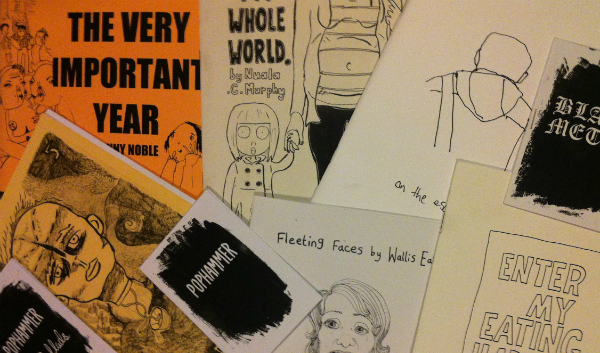
Have realistic expectations and be appreciative of the people who support you
You only think you know how many review submissions sites like Broken Frontier or any of our fine colleagues elsewhere on the internet get. It simply isn’t possible for us to review everything we’re offered, to post every press release or to respond to every interview request. The frustration of not getting the coverage you need to make that next step up is probably only equalled by the frustration we feel that we can’t give everything equal time.
So be realistic about the review submission process. If it doesn’t happen this time then chalk it up to experience and persevere again with the next project. Naming, “shaming” and complaining on social media about sites that haven’t reviewed you will not help your cause. It will also put off other potential reviewers. Not getting coverage is not necessarily a reflection on you or your work.
And always remember that the majority of reviewers promoting small press work are doing it in their own time, often unpaid and because they want to champion the scene and the people working within it. It’s never a good look to get angry on social media with people whose support and hard work is such an important part of the small press comics community.
Build on positive reviews
Once you have some positive reviews under your belt then build on them. Make sure you link to them in review requests to other reviewers to underline good word of mouth. Don’t be afraid to use pull quotes from reviews on covers, on your website, in publicity, on tables at cons and fairs, or your e-mail signature.
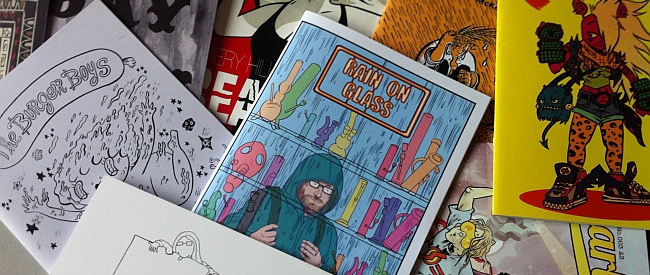
Be active on social media
Social media can be a challenging experience to navigate and sometimes it feels incredibly frustrating when interaction seems sparse. But the potential benefits in getting your work out to wider readerships remain. Retweet reviews, post site and store links, and use it to push work-in-progress. Sometimes it can feel like a longshot but I have certainly discovered a number of artists via Twitter and Instagram who have gone on to Broken Frontier coverage.
Ignore the nay-sayers who say you shouldn’t re-post praise. For a grassroots practitioner this kind of commentary is vital in publicising your comics. You have every right to push your work and alert others to positive feedback on it.
Approach small press-friendly comic shops
You will find that small press sections work on different business models in different shops, and degrees of curation as to what is accepted for sale may also vary from store to store. Get in touch with your local shop by e-mail or via social media to discover if they are currently accepting small press comics and, if so, on what terms. Some may offer sale or return, for example, while others may be able to offer a straight purchase for stock.
Consider other methods of delivery for your work
 If you have had demonstrably good online feedback to your comics from noted online commentators then why not check out the submissions policies for the wealth of wonderful anthology titles we have in the UK? I have covered many of them in ‘Small Pressganged’. It’s another potential avenue to greater exposure and also a chance to interact with your peers in the small press community.
If you have had demonstrably good online feedback to your comics from noted online commentators then why not check out the submissions policies for the wealth of wonderful anthology titles we have in the UK? I have covered many of them in ‘Small Pressganged’. It’s another potential avenue to greater exposure and also a chance to interact with your peers in the small press community.
Visit small press and zine fairs and talk with other creators. Sharing experience with others in the same situation as you – or those who have been in your shoes in the past – is an invaluable exercise.
Embrace Your Comics Community
While real world events are very much on hold at the moment there are still plenty of online ways to get involved with your peers and the wider comics scene. Supportive groups like WIP Comics are a fabulous way to get feedback and advice from those who have already been through similar experiences. Social events like the Gosh! Comics and Broken Frontier Drink and Draw Online give you a chance to interact with other artists in a fun, friendly environment. And when the world is in a happier place again those signings, panel events and discussion groups that so many shops put on are a great opportunity to raise your profile by meeting like-minded souls. When we can finally get to shows and festivals again then check to see if there are communal tables at events if you cannot get a table yourself. Broken Frontier quite often runs communal tables at small press fairs to sell your comics on your behalf, for example.
***
As I mentioned at the top of this column, this was written very much with a specific audience of artists in mind – primarily those working with very small print runs who are new to self-publishing and possibly even new to comics. A number of these points were originally culled from e-mail correspondence I have had with newbie small pressers over the years who had contacted me to ask for my thoughts on how they can push their work further. The feedback I’ve had suggests it was of at least some use to them. I hope that also extends to those starting out on their own self-publishing adventures and that they too find some benefit in this edition of ‘Small Pressganged’!
As ever, your thoughts on this column in the ‘Comments’ section below and any further suggestions are actively encouraged…






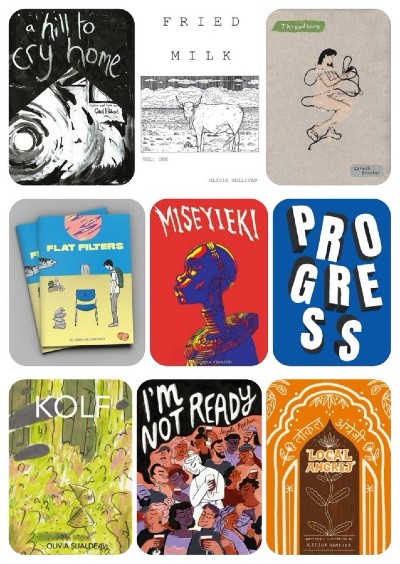










This is very helpful! I’ll do my best to bear this all in mind when I submit my comic to you for review!
[…] How *Do* I Get Coverage for My Self-Published Comic? (2020 Edition) – Thoughts on How to Secure that All-Important First Review and Increasing Your Audience Afterwards… https://www.brokenfrontier.com/small-press-comics-self-publishing-published-reviews-coverage/ […]